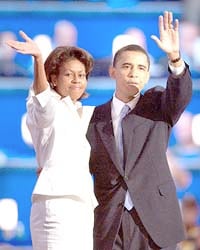Latest Gear Live Videos
Friday October 17, 2008 9:38 pm
Michelle Obama—Princeton Student and Advocate of Segregation

When the story of Michelle Obama’s controversial senior year thesis at Princeton University surfaced in February (during the height of the presidential primary season), it was all but ignored by the mainstream media. Even in alternative media outlets, it was overshadowed by Mrs. Obama’s comment that she first became “proud” of her country after her husband’s presidential campaign looked promising.
Although the Princeton library had intended to restrict release of the document until November 5, the Obama campaign, under pressure, ultimately gave in to Politico.com. Read the entire thesis.
Politico.com
After carefully having read the thesis myself, I’ve decided that it’s a “must-read” for every voter. Oh, I know opponents will argue that we’re not electing a first lady; we’re electing a president. True, but modern first ladies have had at least some influence in their husbands’ administrations. And we can safely assume Michelle would play an active role in an Obama administration, judging from her passionate participation in the campaign.
The underlying tone of the thesis appears to be bitterly pro-segregation and racist. On pages 26-27 of the paper, the future Mrs. Obama notes “Such leaders as Stokely Carmichael” who “were stressing the need for Blacks to separate themselves from White society in order to strengthen the Black community.”
We should remember this same Carmichael, whom the then-Michelle LaVaughn Robinson referred to as a “leader,” told Cuban crowds in the 1960s, “We do not want peace in Vietnam. We want the Vietnamese people to defeat the United States.” Carmichael, who described the U. S. as “hell,” repeatedly preached that “revolution” is the “answer” to racial problems.
Michelle Obama was more than likely telling the truth when she stated in February that “For the first time in my adult lifetime, I am really proud of my country.” Her Princeton thesis suggests she was obviously not proud of her country when she was a college student.
Much to her chagrin, the results she obtained from her survey taken for the study were not what she had expected (or hoped for.) The Black alumni of Princeton who responded to the questionnaire did not overwhelmingly share her views on segregation.
Should Michelle’s racist, pro-segregation attitude prevail during an Obama administration, there’s cause for concern that all the progress made in civil rights during the Democratic administrations of John F. Kennedy and Lyndon B. Johnson could be threatened or reversed, resulting in a return to pre-Selma, Alabama, America. Is this what sincere Democrats really want?
- Related Tags:
- alabama, civil rights, democrats, john f. kennedy, lyndon b. johnson, mainstream, media, michelle obama, president, princeton university, selma, stokely carmichael, vietnam
Advertisement
Advertisement
Advertisement
© Gear Live Media, LLC. 2007 – User-posted content, unless source is quoted, is licensed under a Creative Commons Public Domain License. Gear Live graphics, logos, designs, page headers, button icons, videos, articles, blogs, forums, scripts and other service names are the trademarks of Gear Live Inc.




Comments:
Barack’s own words make me think he’s the same way.
http://www.youtube.com/watch?v=DdLX3aRNaNk
http://www.youtube.com/watch?v=lI77cU3jsFs
Thanks, Sal, for posting the videos. I believe as you do about Barack himself, and I intend to delve deeper into this for a blog in the very near future.
First off, why don’t you think the thesis is a “must-read” for every voter? Why should they only read the introduction? Are you insulting the American voters’ intelligence and inferring they might not understand it? I agree, they shouldn’t rely on biased interpreters to explain it. And that’s exactly what those who listen to the mainstream media (MSM) do. They need to read the entire thesis themselves, not just the intro.
Why do I feel the progress made in civil rights in the ‘60s could be reversed? What I was getting at is that racial tensions have eased substantially since then. Isn’t there the possibility that these tensions could arise again if we have an administration that constantly brings up the issue of race? It seems that Mr. & Mrs. Obama don’t look at the voters as “Americans”, but rather in the context of “Black” or “White”.
Regarding Stokely Carmichael, she refers to him as a “leader”. If I were to write a paper on a white supremacist and call him simply a “leader” without using an adjective such as “violent”, you’d call me a racist. She could easily have referred to Carmichael as a “violent leader”. Instead, the feeling one gets is that she condones any means that would justify an end, including violence.